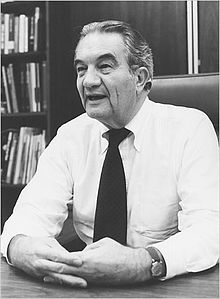- Otto Fuerbringer
-
Otto Fuerbringer (September 27, 1910 – July 28, 2008) was an editor for the American news magazine Time.
Fuerbringer was born in St. Louis, to Ludwig and Anna Zucker Fuerbringer. He was the youngest of five children.[1] As a student at Harvard, he edited the student newspaper The Harvard Crimson.
After graduating in 1932, he started working for the St. Louis Post-Dispatch, before being hired by Time in 1942.[2] Reaching the rank of assistant managing editor in 1951, he was appointed managing editor in 1960.[3] Later, as head of Time Inc.'s magazine-development group, he also introduced People magazine.[2]
During Fuerbringer tenure as editor, the magazine's circulation rose from three to five million.[1] He did much to rejuvenate what was a rather austere publication, and once famously said of the journalism his staff did that "It only has to be true this week."[4] Though a social conservative, Fuerbringer nevertheless did much to focus the magazine's attention on the counter-culture and the political and intellectual radicalism of the 1960s.
A 1964 issue dealt with the sexual revolution, while in 1967 the birth control pill was discussed.[1] His best known act as editor was probably his April 8, 1966 cover story "Is God Dead?"[5] In the accompanying article he explored the role of religion in an increasingly secular society, and investigated a trend among contemporary theologians to write God out of the field of theology.[2] Fuerbringer had initially been a supporter of the Vietnam War, but in 1968 he wrote an editorial conceding that the war was unwinnable.[2]
Shortly before his death, in 2007, he wrote an autobiography, titled "On TIME".[1] Fuerbringer was married to his wife Winona Gunn Fuerbringer for 68 years. The couple had four children.[2] The Pulitzer Prize-winning journalist David Halberstam once said of Fuerbringer "He was the most controversial man within Time magazine, immensely influential, perhaps the most influential conservative of his generation in journalism, but outside the magazine almost no one knew his name."[6]
References
- ^ a b c d Hevesi, Dennis (2008-07-30). "Otto Fuerbringer, Former Time Editor, Dies at 97". The New York Times. http://www.nytimes.com/2008/07/30/us/30fuerbringer.html?n=Top/Reference/Times%20Topics/Organizations/T/Time%20Inc.. Retrieved 2009-05-12.
- ^ a b c d e Schudel, Matt (2008-08-01). "Otto Fuerbringer; Time Editor in 1960s Helped Start Money, People Magazines". The Washington Post. http://www.washingtonpost.com/wp-dyn/content/article/2008/08/01/AR2008080100146.html. Retrieved 2009-05-12.
- ^ "Staff changes". Time. 1960-03-28. http://www.time.com/time/magazine/article/0,9171,826109,00.html. Retrieved 2009-05-12.
- ^ Corliss, Richard (2005-05-20). "Cannes Diary X: Palmed Off". Time. http://www.time.com/time/arts/article/0,8599,1064404,00.html. Retrieved 2009-05-12.
- ^ Fuerbringer, Otto (1966-04-08). "Toward a Hidden God". Time. http://www.time.com/time/magazine/article/0,9171,835309,00.html. Retrieved 2009-05-12.
- ^ Halberstam, David (2000). The Powers That Be. p. 453. ISBN 0252069412.
Further reading
- Fuerbringer, Otto (2007). On TIME. Peter Fuerbringer (publisher).
Categories:- 1910 births
- 2008 deaths
- American magazine editors
- American autobiographers
- The Harvard Crimson people
- People from St. Louis, Missouri
Wikimedia Foundation. 2010.

